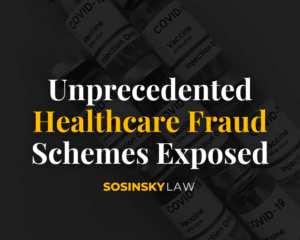NYC Investment Fraud Lawyer
Securities and Investment Fraud Lawyer in New York City
While the public is quite familiar with many high profile prosecutions of individuals for stock and investment fraud — such as the cases of former Congressman Chris Collins, Raj Rajaratnam, Bernie Madoff, Richard Scrushy, and Martha Stewart — what is less well known is that these cases are on the uptick. In the last five years, federal prosecutions of this type of white-collar fraud have increased by more than 13%. And although it may be thought that securities and investment fraud charges are treated less severely than other federal crimes, the statistics do not at all bear this out. The average sentence handed out for this offense is more than four years in federal prison despite the fact that most convicted are in their fifties and have never before been arrested. In fact, where someone is convicted of securities or investment fraud, more than 85% of the time, they were sentenced to incarceration. When crushing financial penalties, loss of registered licensure, and damage to one’s reputation is added to the mix, it is easy to see that being accused in federal criminal prosecution for securities or investment fraud is a serious matter. These fraud charges require serious attention and professional counsel from an NYC investment fraud lawyer as soon as possible.
If you work in the financial services industry and believe that you may be the subject or target of an SEC, FINRA, or other regulatory or criminal investigation of alleged fraud, you would be wise to immediately consult with counsel experienced in representing those accused of federal securities and investment fraud. If your federal defense attorney is retained early enough in the investigation, there is an increased opportunity to intervene and hopefully to steer the probe in a direction that ends favorably — without criminal prosecution. If matters have progressed to the point where you have been criminally charged with engaging in securities or investment fraud, it is equally important that you work with an attorney who has helped others like you fight these serious accusations. NYC investment fraud lawyer Fred Sosinsky brings more than 30 years of aggressive litigation experience to the table. Fred has represented numerous individuals involved in the financial services industry who found themselves under SEC and federal criminal investigation or indictment for acts of fraud. Fred’s skillful and strategic approach to these complex matters has allowed him to gain successful outcomes for many of his clients, even where such results seemed a long shot. Contact Fred now to discuss your situation.

What is Securities and Investment Fraud?
Although there are a number of federal statutes that make it a crime to engage in securities fraud, the most significant of those statutes and the one that is most frequently utilized to charge such violations provides that a person commits securities or investment fraud when he or she knowingly executes or attempts to execute a scheme or artifice to defraud another person in connection with security or commodity or to obtain money or property from such person from the sale or purchase of a security or commodity by means of false or fraudulent pretenses, representations or promises.
Securities and investment fraud essentially involves using deceptive or manipulative means in connection with the purchase or sale of securities or commodities. Federal law defines securities expansively to include a wide variety of investments such as investment contracts, options, municipal bonds, banknotes, and stocks.
Common Types Of Securities Fraud
Insider Trading: May be charged when a person with a fiduciary duty to maintain the secrecy of certain material, non-public information concerning the affairs of a publicly-traded company engages in the sale or purchase of the company’s securities based on such information or provides such information to others who do so either for the insider’s account or their own.
Outsider Trading
May be charged when a person gains access to material, non-public information by affirmatively misrepresenting their identity, such as by computer hacking, and trades on such information.
Misrepresentations
May be charged when a person knowingly makes false statements in order to induce another person to purchase or sell any security; may also be charged when a person attempts to manipulate the value of a security by knowingly making false statements or representations concerning the security in order to profit from the expected impact of such falsities.
Executive Misrepresentations
May be charged when an officer, director, or manager of a publicly-traded company knowingly makes false or misleading statements about the financial status of the company that would cause an investor to take some action regarding the company.
Accounting Fraud
May be charged when an accountant purposely falsifies or manipulates the financial statements or reports of a publicly-traded company so as to mislead the public as to the financial status of that company.
Churning
May be charged when a securities broker engages in excessive trading in a client’s account for the purpose of generating additional commissions and fees generated by such improper trades rather than earning profits for the client.
Embezzlement Schemes
May be charged when a securities broker or investment advisor engages in the unauthorized theft of the funds or property of a client.
Pump-and-Dump Schemes
May be charged where a securities broker owns or controls a position in a stock and then knowingly makes false or fraudulent statements, representations, or promises to a client to induce them to purchase the stock, following which for their own benefit, the broker sells their own position in the security at a profit before the falsity of the statements is discovered.
Lying to Corporate Auditors
May be charged if an executive knowingly makes false or fraudulent statements to auditors about a material matter so that the auditor is misled into reporting or failing to report about such matter.
Owing to the breadth of the securities and investment fraud statutes, there are many other activities that may form the basis for an SEC, FINRA, or criminal investigation and ultimately for a federal indictment.
Whenever one is charged with securities or investment fraud, you can expect that the SEC will also commence a civil enforcement action in the federal district court charging you with the same misconduct and seeking separate, even greater, monetary relief (up to three times the profit or loss avoided) along with injunctive sanctions. Defending this separate or “parallel” proceeding while litigating the criminal action requires strategic consideration and planning from an NYC investment fraud attorney who has handled similar cases in the past.

Sentencing for Securities and Investment Fraud
Federal securities and investment fraud are punishable by up to twenty-five (25) years in prison, in addition to significant fines, restitution, and forfeiture. As with all federal offenses involving fraud, the first task of a court deciding upon an appropriate sentence for this crime is to determine the applicable advisory federal sentencing guideline range. The single most important factor under the guidelines in any matter involving fraud is the amount of “loss” caused by the defendant’s offense conduct. In cases of securities fraud, especially if publicly traded securities are involved, there may be a pointed dispute concerning how justly to measure the loss caused to investors by the defendant’s misconduct. Other factors bearing upon the guidelines calculation are the number of victims and the impact upon such victims of the crime, whether sophisticated means were used, whether the defendant was an officer, director of a publicly-traded company, a broker, dealer, or investment advisor, what role a defendant played in the overall offense and whether, as is all too common in these matters, the defendant obstructed justice to conceal their crime.
Once the non-binding sentencing guideline level is determined, a sentencing judge will consider everything there is to know about the person convicted. Hopefully, and it is usually the case, defense counsel is able to present powerful evidence of the favorable history and character of that person and work to convince the court that incarceration is not necessary to accomplish the goals of sentencing.
There are Defenses to Securities and Investment Fraud
Although the availability of any defense will be entirely dependent on the evidence presented, the following defenses may be employed:
First, as with all white collar fraud charges, the government must prove that the accused knowingly engaged in a scheme to defraud. If it can be shown that the accused lacked knowledge that a securities transaction or suspect corporate disclosure involved deceit or intentional misrepresentation, a viable defense may be present.
Second, often enough, a person accused of making a false statement or omission was reliant on data or information provided to him or her by others in the same organization. If this is the case, a “good faith” defense — that is, that the accused believed in the truth and accuracy of the matters at issue — may be asserted.
Third, it may be possible to argue that the statements alleged to have been false were not of the type that would have been relied upon by an investor in making an investment decision. The availability of this defense is normally limited to those cases in which the purported victims of fraudulent misrepresentations are sophisticated and savvy investors able to ferret out what is and what is not important information.
Contact An Experienced NYC Investment Fraud Lawyer Today
If you have received a visit from FBI agents or SEC investigators, a subpoena for records, or had your home or office searched pursuant to warrant, it is imperative that you contact an experienced, aggressive white-collar criminal defense attorney now. Contact NYC investment fraud lawyer Fred Sosinsky today and start preparing your defense to these allegations.
SOS? CONTACT SOSINSKY
NYC Criminal Defense

Unprecedented Healthcare Fraud Schemes Exposed
Unprecedented Healthcare Fraud Schemes Exposed: A Glimpse into the Recent DOJ Crackdown In a groundbreaking move, the Department of Justice has unveiled criminal charges against

Conspiracy Charges in NY
NYC Conspiracy Crime Lawyer Conspiracy charges in NY are valid when two or more parties make a clear agreement to engage in criminal activity. Under

Federal Crimes Vs. State Crimes
Acts which are illegal under the laws of the United States federal government are known as federal crimes or federal offenses. Federal crimes are different
